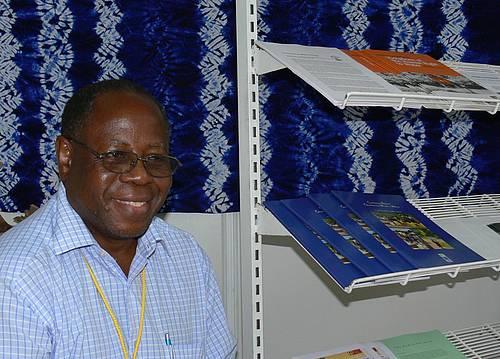For the first time, the All Africa Conference of Churches gave prominent space to the water and environmental crises at its general assembly in Maputo, Mozambique, 7-12 December.
The assembly, which had "Environment and Spirituality" as one of nine sub-themes, came at a time when a cholera outbreak in Zimbabwe illustrated how pollution, environmental degradation and inadequate water supply are affecting people in Africa.
In a worship service "Celebrating God's Creation" delegates and guests of the assembly confessed to having created excessive greenhouse gases and to having polluted the land. Prof. Samuel Mukasa, University of Michigan, reflected on the growing numbers of cars and "matatus" (minibuses) as one example of how population growth in Africa is increasing the pressure on the environment and contributing to climate change.
Speakers and participants in the series of workshops on environment and spirituality, which was supported by the Ecumenical Water Network, highlighted the interconnectedness of environment, water, and food crisis. From all over Africa experiences were shared of how people are losing their livelihoods because of climate change and environmental degradation.
But participants also heard stories of faith and hope. One such story was told by Joshua Mukusya from the development organization Excellent Development about Utooni village in Kenya.
Nowadays, many people claimed "that there is no rain anymore," Mukusya said. "But we have heavy rain in a short period. All we have to do is be prepared for it when it comes."
"The biggest resource of transformation is the people, the commitment of the community, not the money," he added. For years his community has worked to improve their environment through rainwater harvesting and soil conservation.
Many participants in the workshop were amazed when Mukusya showed the results of the community's hard work in a video: lush and green fields of vegetables and maize, a small garden Eden right in a semi-arid area with no permanent rivers and very little rainfall.
"We believe that addressing the ecological crisis is [ ] about our worldview, our identity our morality, our spirituality," affirms the final Maputo Covenant which was adopted by the delegates at the end of the assembly. "We affirm that earth keeping is a crucial dimension of the church's mission and we need to confess of the times when the church has been unfaithful in this mandate or at worst, acted and taught against [it]."
"As a development worker, I am a witness of how development is hampered without water," said Augustine Mwaimu, programme officer for the Anglican Church of Tanzania and a partner of the Ecumenical Water Network. "I also see how much more we can still do, not only to avail water to thirsty communities but also to sustain the ecology. This assembly has revived my vigour to address the challenges the church is facing."
The Ecumenical Water Network is an initiative of churches, Christian organizations and movements working on people's access to water around the world and community-based solutions to the water crisis. Its objective is to bring forward a common Christian witness in the debate on water issues. The World Council of Churches hosts the network's secretariat and helps to facilitate cooperation among the partners involved.
Photo gallery on AACC assembly participants and water




